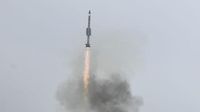In a bold military maneuver, the Indian armed forces executed Operation Sindoor in the early hours of May 7, 2025, targeting nine terrorist bases in Pakistan and Pakistan-occupied Kashmir (PoK). This operation was a direct response to the recent Pahalgam attack on April 22, which tragically claimed the lives of 26 individuals, including 25 Indian nationals and one Nepali citizen.
The strikes were meticulously planned and involved the coordinated efforts of the Indian Army, Navy, and Air Force, utilizing precision strike weapon systems, including loitering munitions (LMS). These advanced weapons can hover over a target area, allowing operators to identify and strike with high accuracy. The precision strikes were aimed specifically at the leadership of Jaish-e-Mohammed and Lashkar-e-Taiba, two groups notorious for orchestrating terrorist attacks against India.
According to India's Ministry of Defence, the operation was characterized as "focused, measured, and non-escalatory in nature," with no Pakistani military facilities being targeted. The intent was to dismantle the terror infrastructure responsible for the Pahalgam attack while minimizing the risk of escalating tensions between the two nuclear-armed nations.
Prime Minister Narendra Modi, who closely monitored the operation, had previously vowed to "identify, track, and punish" those responsible for the Pahalgam attack. The Indian Army confirmed the operation in a statement released at 1:44 AM, emphasizing that the strikes were executed from within Indian territory, based on coordinates provided by intelligence agencies.
Pakistan's response was swift, with Prime Minister Shehbaz Sharif labeling the missile strikes an "act of war." He asserted that Pakistan has the right to respond strongly, stating, "The Pakistani nation and its armed forces know very well how to deal with the enemy." In retaliation, the Pakistani military fired artillery in the Bhimber Gali area of Jammu and Kashmir shortly after the operation, resulting in civilian casualties.
The use of loitering munitions, often referred to as suicide drones or kamikaze drones, marked a significant development in India's military capabilities. These drones are designed to hover over a battlefield, allowing for real-time targeting of identified threats. They combine the surveillance capabilities of traditional drones with the destructive power of missiles, enabling precise attacks while reducing the risk to personnel.
In December 2024, the Indian Army received 480 loitering munitions from a Nagpur-based defense company, with over 75% of their components being domestically manufactured. The first indigenous loitering munition, Nagastra-1, was developed by Solar Industries, showcasing India's growing reliance on homegrown defense technology.
The successful execution of Operation Sindoor has garnered widespread support across India's political spectrum. Defence Minister Rajnath Singh, along with various state leaders, praised the armed forces for their decisive action. Singh expressed his sentiments on social media, stating, "Bharat Mata ki Jai," a rallying cry that resonated with many in the nation. Other leaders, including Uttar Pradesh Chief Minister Yogi Adityanath and Assam Chief Minister Himanta Biswa Sarma, echoed similar sentiments of national pride and support for the military's operations.
Opposition leaders also voiced their support, with Shiv Sena (UBT) leader Priyanka Chaturvedi remarking, "They asked about religion. Now suffer your karma. Indian Army." Aditya Thackeray, another UBT leader, emphasized the need to eliminate terrorism, stating, "Hit them, hard enough that terrorism doesn't stand a chance ever again. Jai Hind!" RJD leader Tejashwi Yadav expressed pride in the Indian Army, asserting, "Hail India! There should be neither terror nor separatism!"
The operation, however, has raised concerns about the potential for escalation in an already tense region. Experts warn that the retaliatory actions from Pakistan could lead to a cycle of violence, further complicating the already fragile security situation in Jammu and Kashmir.
As the situation unfolds, the Indian Army remains vigilant and prepared to respond to any further provocations. The Additional Directorate General of Public Information (ADG PI) released a statement confirming that the Indian Army is responding appropriately to Pakistani artillery fire, maintaining a calibrated approach to ensure the safety of Indian civilians while defending territorial integrity.
Operation Sindoor represents a significant moment in India's ongoing struggle against terrorism and its commitment to protecting its citizens. The targeted approach, utilizing advanced technology and intelligence, reflects a strategic shift in how India addresses threats emanating from across its borders.
As international observers closely monitor the situation, the implications of Operation Sindoor extend beyond immediate military objectives, potentially reshaping the geopolitical landscape in South Asia. The operation underscores the importance of addressing terrorism while navigating the complexities of international relations and regional stability.
In summary, Operation Sindoor has been a decisive military response to terrorism, showcasing India's capabilities and resolve. As the region braces for possible repercussions, the focus remains on ensuring security and stability in a landscape fraught with challenges.







